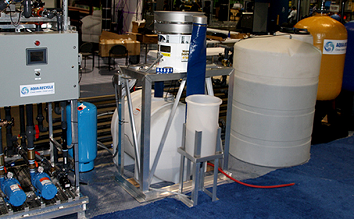NATIONAL REPORT—Using different technologies, two innovative suppliers are making sure that the energy housed in laundry machines is not just sent down the drain after each wash load. Hotel owners investing in such systems are saving money, water, energy and helping to reduce their environmental impact at the same time. The two companies are AquaRecycle and SHARC International Systems. While AquaRecycle has been helping hoteliers for many years, SHARC International Systems is just beginning to establish a presence in the lodging industry.

AquaRecycle specializes in recycling laundry waste water. AquaRecycle has more than 400 systems installed worldwide and has recycled over 10 billion gallons of wash water to date. The company’s patented, closed loop laundry wash water recycling system reduces incoming water usage by 80 percent, cuts energy costs to heat water by up to 50 percent and reduces sewer discharge by 95 percent for a payback in less than two years.
Jeff Lebedin, Chairman and Managing Member of AquaRecycle, says about half of his company’s installations are in hotels or centralized laundries that service hotels. “Ninety to 95 percent of our systems go in after the hotel is built.”
The AquaRecycle system can reside adjacent to the laundry machines or as far as several hundred yards away. Key to reusing laundry water is making sure it is as sanitized and filtered as possible. “We take the wastewater, run it through a vibrating lint shaker to remove 80 to 90 percent of suspended solids,” Lebedin says. “We run it through pressure filters that remove additional solids, chemicals, and contaminants. The media absorb the contaminants. We put it in another tank that supplies the machine. The media is replaced once each year.”
Water Kept Sanitized
Lebedin says most laundries operates less than half the time. When the recycled water is sitting, ozone is injected into it to keep it sanitized. When the AquaRecycle system is running, the water passes by a UV light which also disinfects the water. Ultimately, the temperature of the clean, recycled water is about the same temperature of the wastewater, typically around 120 degrees.
AquaRecycle’s AquaSmart 6.0 is now connected with each of the company’s 400+ systems worldwide through a high speed Secure Private network. This provides a tunnel to tunnel connection providing 24/7 continuous monitoring of each recycle system for operations, troubleshooting and service.
“We track everything we do,” Lebedin says. “We have flow meters that track performance every day. Everything we do is documented. We provide savings reports. We can press a button and have all our customers’ data. We can always tell how the system is performing.”
More than three years ago, the U.S. Department of Energy (D.O.E.) Building Technologies Office, with the assistance of outside consultants, conducted a demonstration project to evaluate laundry wastewater recycling technology in the hospitality sector. (See article.) The D.O.E. report, entitled, “Demonstration of Advanced Technologies for Multi-Load Washers in Hospitality and Healthcare—Wastewater Recycling Technology,” documents the demonstration of an AquaRecycle wastewater recycling system installed at the Grand Hyatt Seattle.
Lebedin says that it used to be just five-star hotels that installed the AquaRecycle system. That is now changing. He says his company recently put a system in a Courtyard by Marriott. “Water rates keep going up so it becomes more cost-effective,” he says.
Wastewater Heat Recovery System
Almost five years ago, Green Lodging News reported on a new system, SHARC, that captures and reuses heat that is typically lost to the sewage system—the black water that is flushed down toilets. SHARC Energy Systems is the name of the company in British Columbia that developed the wastewater heat recovery system. The company recently installed its first system at a hotel—the Piranha T10 waste water heat recovery system at the Lake Louise Inn in Lake Louise, Alberta. This time heat is being recovered not from black water but from laundry waste water.

“It is in the laundry room and works flawlessly,” says Lynn Mueller, Chairman and CEO of SHARC Energy Systems. “It recovers waste heat from three machines.
The Piranha system’s self-contained heat pump uses a proprietary direct expansion heat exchanger to extract thermal energy. Hot water is collected from the inn’s laundry machines. Rather than draining into a sewer at 120 to 140 degrees as is the currently accepted waste water practice, the heat energy in the water is recovered. The water acts as a source for a heat pump, which is then used to heat incoming cold water for future loads, drastically reducing energy requirements.
As a result, the Piranha system is providing the following benefits to the Inn:
- Will reduce emissions by over 80 tons of CO2 each year, taking the equivalent of 17 cars off the road;
- Will reduce the laundry’s energy use by 85 percent; and
- The savings from each 100 loads of laundry can provide energy for an additional eight days.
Mueller says the Lake Louise Inn had been using propane as the fuel to heat the water for the laundry. That fuel is expensive and dirty. The Inn will save $50,000 a year in propane costs (25,000 gallons) and the environmental impact of trucking in propane has been dramatically reduced. The payback will be about two years. “Even with natural gas the payback is three to four years,” Mueller says.
Property Managed by Atlific Hotels
The Lake Louise Inn is managed by Atlific Hotels. “This wonderful opportunity to put environmental stewardship to work in a practical way aids our conservation efforts with meaningful results,” said Gordon Johnson, Vice President Operations, Atlific Hotels. “The serious reduction in water and energy use and greenhouse gas emissions will be of benefit to everyone who appreciates the importance of preserving Lake Louise’s natural resources, and certainly makes sense from a business perspective. It’s a win-win for all.”
Mueller says SHARC technology makes sense not only with laundry but with other hot water going down the drain. “On a new building it makes absolute sense,” he says.
Glenn Hasek can be reached at editor@greenlodgingnews.com.





